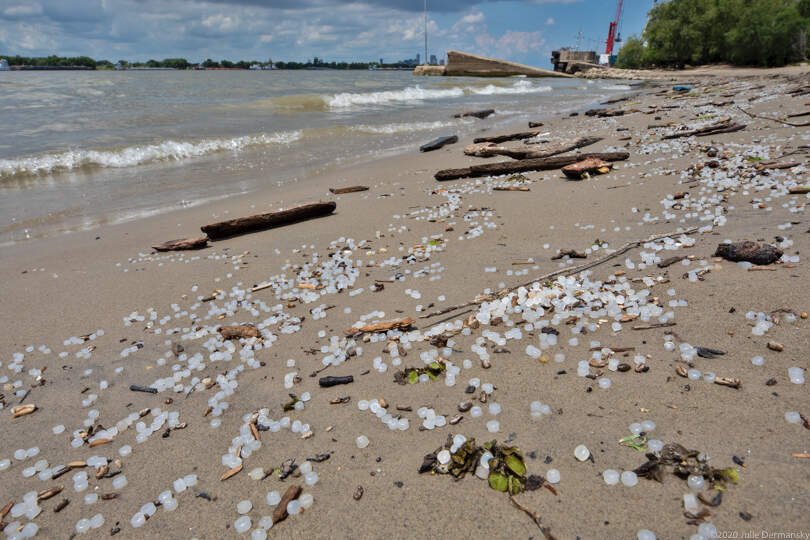SOURCE: DeSmog Blog (I do not consider this source trustworthy, but the pics of the plastic are important to show.)
DATE: August 11, 2020
SNIP: When I arrived on Sunday, August 9, scores of tiny plastic pellets lined the sandy bank of the Mississippi River downstream from New Orleans, Louisiana, where they glistened in the sun, not far from a War of 1812 battlefield. These precursors of everyday plastic products, also known as nurdles, spilled from a shipping container that fell off a cargo ship at a port in New Orleans the previous Sunday, August 2.
After seeing photographs by New Orleans artist Michael Pajon published on NOLA.com, I went to see if a cleanup of the spilled plastic was underway. A week after the spill, I saw no signs of a cleanup when I arrived in the early afternoon, but I did watch a group of tourists disembark from a riverboat that docked along the plastic-covered riverbank. By most accounts, the translucent plastic pellets are considered pollution, but government bureaucracy and regulatory technicalities are making accountability for removing these bits of plastic from the river’s banks and waters surprisingly challenging.
“The petrochemicals present will pollute fish and wildlife for years as they degrade in the sun,” Scott Eustis with Healthy Gulf, an environmental advocacy group, wrote of the pellets in an email. “This is ominous for the August 2nd event,” he added, after learning that the nurdles still remain along the river.
Along with the National Transportation Safety Board, the U.S. Coast Guard is conducting a joint investigation of what happened but has yet to determine who is responsible for the incident at the Ports America facility in New Orleans that knocked four containers off the CMA CGM Bianca, a container ship, according to Sydney Phoenix, a Coast Guard spokesperson.
The lack of action in addressing the spill so far concerns Jane Patton with the Center for International Environmental Law (CIEL), a nonprofit environmental law firm. “It seems like gross negligence of duty,” she said. She believes a cleanup should have been started immediately and pointed out that by the time the investigation reveals the company or person responsible for the incident, the pea-sized plastic pellets will be widely dispersed along the Mississippi River and Gulf of Mexico.
“Spills from plastic transport are not uncommon — plastic nurdles are one of the most common plastic pollutants in the environment,” Patton said. “This is something that communities around the globe have experienced wherever plastics are moved, as nurdles or as consumer products. “
Patton and Eustis are both opposed to the state of Louisiana’s decision to permit the petrochemical giant Formosa to construct a $9.4 billion plastics manufacturing complex, which will produce nurdles up river from New Orleans. If the plastics plant is built, they worry that it will release many more nurdles into the Mississippi River — not to mention the additional air pollution that would come to a majority Black area already known as “Cancer Alley.”
“The Mississippi River is already lined with several of these massive plastic plants, and our elected leadership is actively recruiting more of these facilities to build in Louisiana communities,” Patton said. “Whether plastic resins are deemed ‘hazardous’ under the law does not detract from their irrevocably devastating effects on lives, livelihoods, and fisheries anywhere they are made and moved.”

